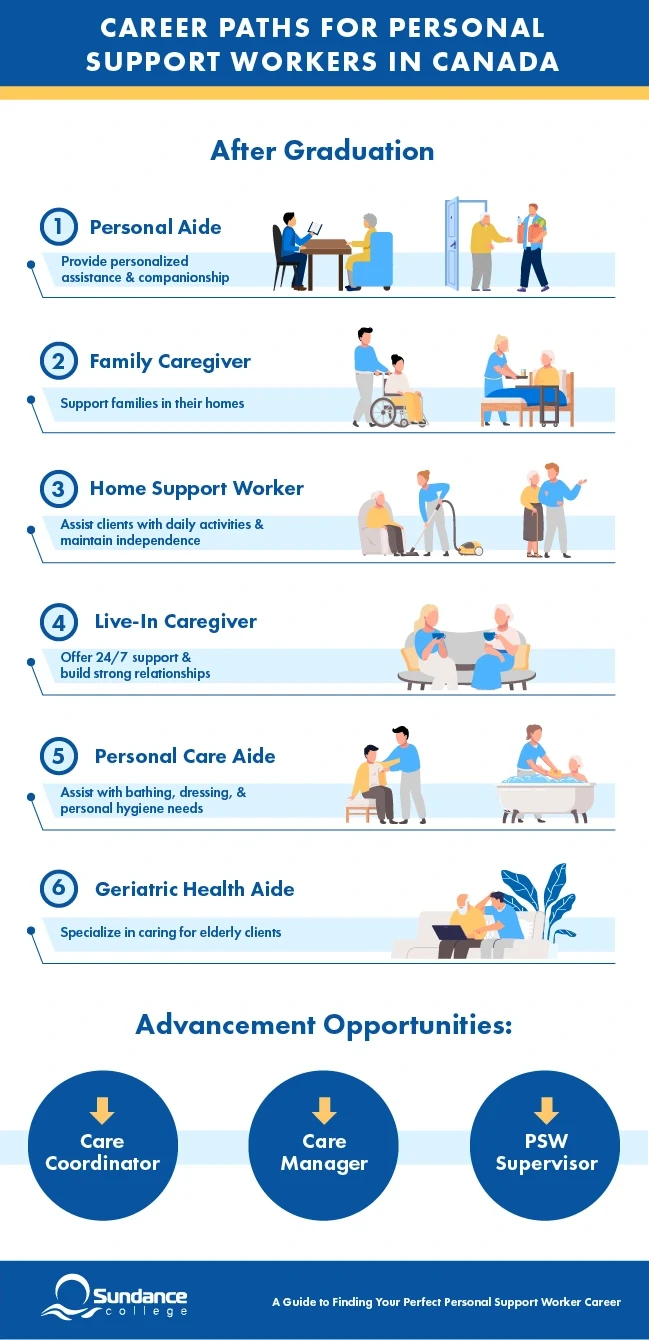Blog / A Guide to Finding Your Perfect Personal Support Worker Career
A Guide to Finding Your Perfect Personal Support Worker Career

Personal Support Worker Diploma
- Personal Aide - Home Support
- Family Caregiver
- Personal Support Worker
- Home Support Worker
Table of Contents
Considering launching a career in caregiving? The field offers diverse and rewarding career paths. Personal support workers (PSWs) provide essential care and support to patients of all ages, including children with disabilities, elderly individuals recovering from surgery, adults living with chronic illnesses, new mothers, and more. PSWs work in diverse healthcare settings, including hospitals, rehabilitation centers, long-term care facilities, and clients’ homes.
The wide range of patients’ needs and work environments within caregiving creates a variety of personal support worker career paths. To navigate these options and find your perfect fit, this guide serves as your roadmap. We’ll explore the common settings you can work in, the different client populations you can support, and how to identify the PSW path that best aligns with your unique interests and aspirations.
Listen to “Personal Support Worker Careers: Guide to Diverse & High Demand Jobs”
Explore Your Diverse PSW Career Options
The duties and responsibilities of personal support workers extend far beyond traditional senior care. Here’s a glimpse into career paths you can pursue within the caregiving field:

Personal Aide: Provide Personalized Assistance & Companionship
Personal aides offer individualized care and companionship to clients of all ages in their homes or community settings. This could involve tasks like assisting with errands, meal preparation, light housekeeping, and providing emotional support to enhance their overall well-being.
Job titles in Canada: personal support worker (in-home care), companion.
Family Caregiver: Support Families in Their Homes
Family caregivers provide in-home care and support to families with a member requiring assistance. This may involve helping with daily living activities assistance, medication management, and providing companionship to ensure the well-being of both the client and the family unit.
Job titles in Canada: personal care aide, childcare live-in caregiver, in-home caregiver.
Home Support Worker: Assist Clients with Daily Activities & Maintain Independence
Home support workers help individuals maintain independence within their own homes. They assist with daily living activities like bathing, dressing, meal preparation, and light housekeeping, allowing clients to manage their lives with dignity and autonomy.
Job titles in Canada: in-home caregiver, home health aide.
Live-In Caregiver: Offer 24/7 Support & Build Strong Relationships
Live-in caregivers provide continuous client care and support in their homes, often residing in the client’s residence. They offer a broad range of assistance, from daily living activities and medication management to emotional support and companionship, fostering strong and trusting relationships with their clients.
Job titles in Canada: live-in caregiver, live-in support worker.
Personal Care Aide: Assist with Bathing, Dressing, & Personal Hygiene Needs
Personal care aides provide direct care to clients who require assistance with personal hygiene tasks. They assist with bathing, dressing, toileting, and other personal care needs, ensuring the client’s comfort and well-being.
Job titles in Canada: personal care aide, personal care assistant, support services attendant.
Geriatric Health Aide: Specialize in Caring for Elderly Clients
Geriatric health aides provide specialized PSW elderly care in various settings like senior care facilities, assisted living communities, or home care environments. They help with daily living activities, promote mobility and independence, and address the specific needs of the aging population.
Job titles in Canada: geriatric care assistant, senior caregiver, continuing care assistant.
Matching Your Skills & Interests with the Perfect PSW Role

Choosing the right personal support worker career path is an important step towards a fulfilling and rewarding experience. Here are three key factors to consider when matching your unique skills and interests with the perfect PSW role:
1. Your Unique PSW Skills and Qualities
Analyze your unique strengths and think how they can guide you towards a fulfilling PSW role. For example, here’s how some key personal support worker skills and qualities can influence your choice:
- Strong Communication & Interpersonal Skills: Enjoy building rapport and clear communication? Consider roles in home care or family support, where fostering trust and understanding with clients is crucial.
- Physical Stamina & Dexterity: Do you thrive in a fast-paced environment with physical demands? Explore opportunities in hospital settings or acute care, where assisting with mobility and transfers is essential.
- Organization & Time Management: Adept at managing schedules and prioritizing tasks? Roles in long-term care facilities or with multiple clients could be a good fit, requiring organized care plans and efficient time management.
- Patience & Emotional Intelligence: Do you excel at emotional support and active listening? Consider working with children with disabilities or individuals experiencing mental health challenges. These roles require a calm demeanor and the ability to understand and respond to emotional needs.
- Technical Skills & Adaptability: Comfortable learning new technologies or procedures? Explore specialized care settings like dialysis centers or wound care, where specific technical skills are needed alongside compassionate care.
This is just a starting point! By reflecting on your strengths and interests, you can find a PSW career path that allows you to excel while making a meaningful difference in the lives of others.
2. PSW Work Environment Preferences
PSWs have the flexibility to work in various settings, each offering a unique work environment. Ask yourself:
- Do you prefer a fast-paced environment like a hospital or clinic, or a calmer setting like a client’s home?
- If you prefer a fast-paced environment: Consider roles in hospitals, clinics, or emergency response.
- If you prefer a calmer environment: Home care, assisted living, or working with children/families might be a good fit.
- Are you comfortable working independently, or do you prefer a team-oriented environment?
- Comfortable working independently: Home care, live-in caregiving, or specialized care could be a good choice.
- Prefer a team environment: Hospitals, clinics, long-term care, or working with families often involve collaboration.
- Would you prefer a consistent schedule or a more flexible one with variable shifts?
- Prefer consistency: Hospitals, clinics, or long-term care facilities often have set schedules.
- Enjoy flexibility: Home care and some live-in caregiver roles offer more control over your work hours.
Understanding your preferences will help you narrow down the PSW roles that best suit your work style and environment.
3. Client Age Group Interests
The age group you gravitate towards can also help guide your PSW career path:
- Do you enjoy working with children and families? Consider roles like family caregiver or live-in child care provider.
- Do you see yourself providing disability care for adults? Explore opportunities in community support or specialized care facilities.
- Do you feel a calling to care for the elderly? Geriatric health aide or live-in caregiver roles might be a good fit.
Reflecting on your preferred client age group will help you find a PSW career path that aligns with your interests and allows you to build meaningful connections with your clients.
Ultimately, considering all three factors will help you make an informed decision about your potential employer when exploring current PSW job openings across Canada. And, of course, you can change paths over the course of your career in caregiving.
Taking the Next Step: Your PSW Diploma Journey at Sundance

While your passion and empathy are essential for success as a caregiver, you’ll also need a strong foundation in knowledge and practical experience to provide exceptional client care and navigate the job demands.
This is where a high-quality diploma program, such as the Sundance College Personal Support Worker program, comes in. Personal Support Worker program instructor, Ethelyn W., says:
“At Sundance College, we are dedicated to ensuring that our students are equipped with comprehensive knowledge of the theory and complexity of their courses, as well as the techniques necessary for them to excel as personal support workers in various settings.”
Its well-rounded curriculum, including courses like Safety & Mobility, Assisting with Personal Hygiene, Care Planning & Restorative Care, makes it the perfect choice for launching your rewarding career in caregiving (in just 10 months!).
Here are three more reasons:
1. Clinical Training & Hands-on Experience
At Sundance College, we believe in the importance of practical learning. Our program includes a 7-week clinical practicum placement in various healthcare settings, allowing you to gain valuable hands-on experience build your confidence, and refine your skills working with real clients under the supervision of experienced professionals.
We also have fully equipped PSW labs on our campuses in Calgary and Edmonton, Alberta, that allow our students to gain the practical experience they need to excel in their future healthcare careers.
2. Career Support & Job Placement Assistance
Our dedicated career services team is here to guide you through the job search process. They offer:
- Resume and cover letter writing workshops
- Mock interview sessions
- Job search resources and networking opportunities
- Assistance with connecting with potential employers
We aim to assist you in finding the perfect PSW role that aligns with your skills and interests.
3. Career Advancement & Professional Development
The knowledge and hands-on experience from our instructors, along with on-the-job training and your dedication to growth, will help you move towards leadership roles such as:
- Care coordinator: Act as a liaison between clients, families, and healthcare professionals, ensuring coordinated care plans and access to necessary services.
- Care manager: Oversee the care of a group of clients, supervising PSWs, developing individualized care plans, and ensuring quality care delivery.
- PSW supervisor: Provide direct supervision to PSWs, ensuring they follow best practices, offer support and mentorship, and contribute to a positive and productive work environment.
By investing in your education and demonstrating leadership potential, you can unlock exciting career advancement opportunities within the healthcare field.
We’re more than just an educational program — we’re your partner in building a successful future. From guiding you through your first course to helping you secure your new PSW position, we’re here to support you every step of the way.
Take your first step towards your rewarding future in caregiving by contacting Sundance College today! We’d love to chat and answer any questions you have about our PSW Diploma program. Let’s turn your passion for helping others into a reality together!
Related Blogs
Subscribe for more career advice
Blog Categories
Share on:
